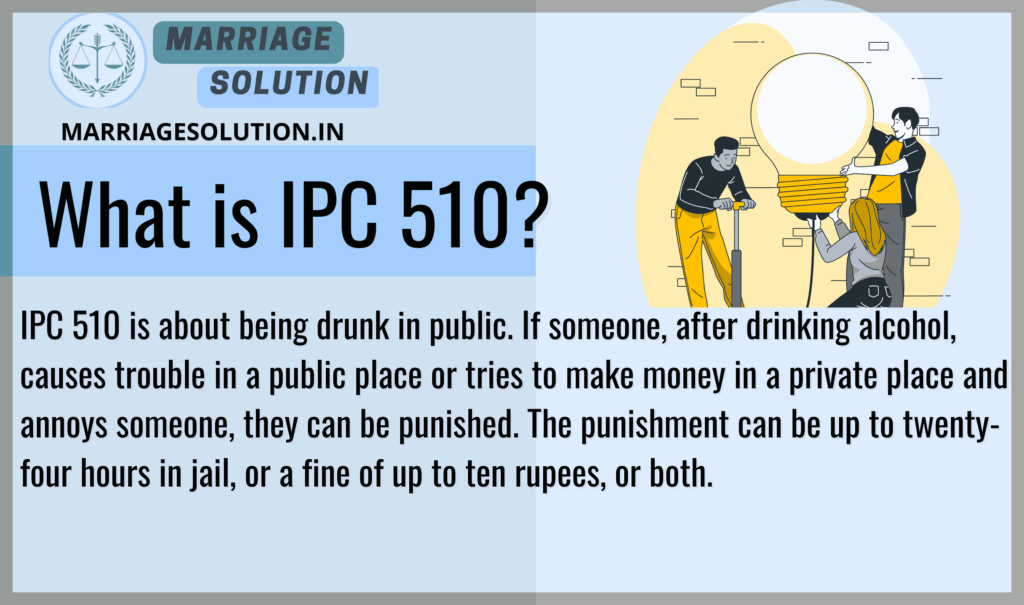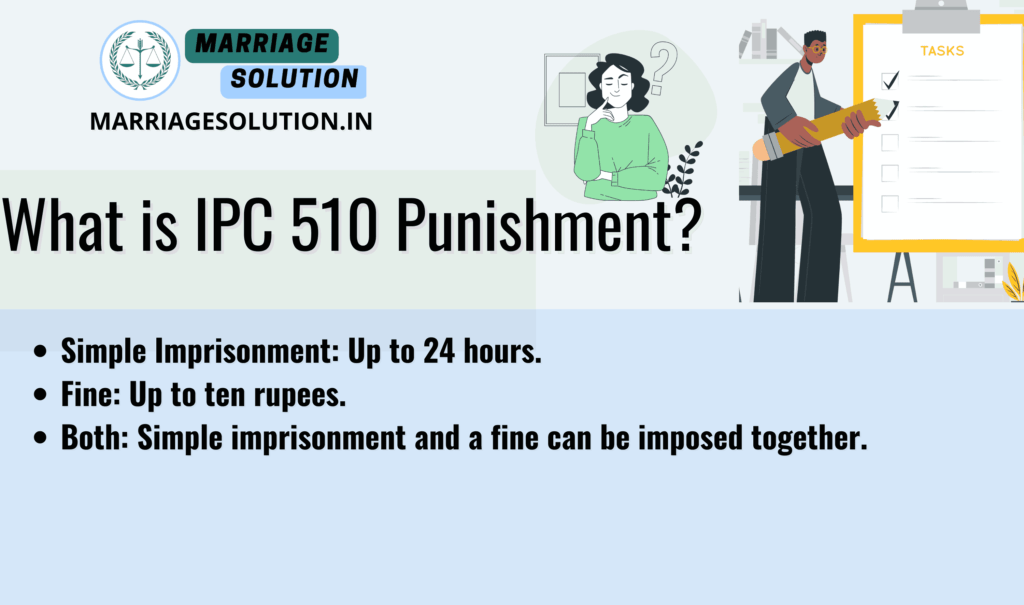Introduction of IPC Section 510
In Indian law, IPC Section 510 deals with actions causing annoyance while intoxicated. It’s aimed at preventing disturbances caused by drunken behavior in public or private places. This law sets out the consequences for such behavior, ensuring public order and safety. Understanding IPC 510 helps maintain harmony and respect in society.
What is IPC Section 510 ?
IPC 510 is about being drunk in public. If someone, after drinking alcohol, causes trouble in a public place or tries to make money in a private place and annoys someone, they can be punished. The punishment can be up to twenty-four hours in jail, or a fine of up to ten rupees, or both.

IPC Section 510 Overview
IPC 510 says that if someone is drunk and causes annoyance to anyone in a public place or a private place where they’re trying to make money, they can be punished. The punishment can be up to 24 hours in jail, a fine of up to ten rupees, or both.
Key Points
- Public Nuisance (Causing Annoyance):
- This refers to behaving in a bothersome way while drunk in a public area.
- The behavior must cause annoyance or disturbance to any person nearby.
- Private Nuisance (For Pecuniary Gain):
- This relates to being intoxicated in a private setting for the purpose of making money.
- The drunk behavior must result in annoyance or disturbance to others present.
- State of Intoxication (Drunkenness):
- It means being under the influence of alcohol or other substances that cause drunkenness.
- Being intoxicated is a key element for this offense to apply.
- Subjective Annoyance (Perceived Disturbance):
- The annoyance caused by the drunk behavior is subjective, based on how others perceive it.
- It depends on whether the behavior is seen as disturbing by those affected.
- Petty Offense (Minor Nature):
- This offense is considered minor in nature compared to more serious crimes.
- The punishment reflects the relatively low severity of this offense.
- Punishment Severity (Lenient):
- The punishment for IPC 510 is lenient, with a maximum of 24 hours of imprisonment or a fine of up to ten rupees, or both.
- This reflects the minor nature of the offense and aims to discourage such behavior without severe penalties.
IPC 510 Punishment
- Simple Imprisonment: Up to 24 hours.
- Fine: Up to ten rupees.
- Both: Simple imprisonment and a fine can be imposed together.

510 IPC bailable or non bailable ?
IPC Section 510 is generally considered a bailable offense. This means that if someone is accused of an offense under IPC 510, they have the right to seek bail and can be released from custody pending further legal proceedings.
Section 510 IPC in short information
| Aspect | Description |
|---|---|
| Definition | IPC 510 deals with the offense of causing annoyance to any person while intoxicated. |
| Offence | Being drunk in a public or private place and causing annoyance to others. |
| Punishment | Simple imprisonment for up to 24 hours, or a fine up to ten rupees, or both. |
| Bailability | Typically considered a bailable offense, meaning the accused has the right to seek bail. |
500 IPC FAQs
What is the essence of the offense under IPC 510?
The essence of the offense under IPC 510 is causing annoyance to any person while in a drunken state, either in a public place or in a private place for pecuniary gain.
Is IPC 510 applicable to sober individuals?
No, IPC 510 is specifically applicable to individuals who are in a state of intoxication or drunkenness. It does not apply to sober individuals.
Is the offense under IPC 510 bailable?
Yes, the offense under IPC 510 is a bailable offense.
Can IPC 510 apply if no one is actually annoyed?
No, IPC 510 requires that the drunken person’s actions must cause annoyance to any person. If no one is actually annoyed, the offense may not be applicable.
If you need support with court proceedings or any other legal matters, don’t hesitate to reach out for assistance.
Court or any other marriage-related issues, our https://marriagesolution.in/lawyer-help-1/ website may prove helpful. By completing our enquiry form and submitting it online, we can provide customized guidance to navigate through the process effectively. Don’t hesitate to contact us for personalized solutions; we are here to assist you whenever necessary!
